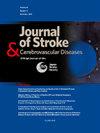Association between anti-Ro52 antibodies and cerebral small vessel disease with neurological functional outcomes in acute ischemic stroke patients
IF 1.8
4区 医学
Q3 NEUROSCIENCES
Journal of Stroke & Cerebrovascular Diseases
Pub Date : 2025-06-17
DOI:10.1016/j.jstrokecerebrovasdis.2025.108383
引用次数: 0
Abstract
Objective
This study investigated the association between anti-Ro52 antibodies, cerebral small vessel disease (CSVD) burden, and neurological outcomes in acute ischemic stroke (AIS) patients.
Methods
We conducted a retrospective study of 127 AIS patients admitted between June 2017 and June 2024. CSVD burden was quantified using a composite score (range: 0-3) based on three neuroimaging markers. Severe CSVD was defined as a score >1. Neurological function was evaluated using the modified Rankin Scale (mRS), where a score >2 at admission and 3 months post-stroke indicated poor outcomes. After propensity score matching, 38 anti-Ro52-positive patients were compared with 38 anti-Ro52-negative controls. Multivariate logistic regression analyses were performed to assess independent associations.
Results
Multivariate analysis revealed that anti-Ro52 positivity, advanced age, and hypertension were independently associated with severe CSVD burden (all p < 0.05). Furthermore, anti-Ro52 positivity, higher NIHSS scores, and severe CSVD burden were independently correlated with poor neurological function at admission and 3 months post-stroke (all p < 0.05).
Conclusion
Our findings demonstrate that anti-Ro52 antibodies are independently associated with severe CSVD burden in AIS patients. Moreover, both anti-Ro52 positivity and CSVD burden are significantly associated with worse neurological outcomes. Our study suggests that anti-Ro52 antibodies may influence stroke severity through the development and progression of CSVD.
抗ro52抗体与急性缺血性脑卒中患者脑血管疾病与神经功能预后的关系
目的探讨急性缺血性脑卒中(AIS)患者抗ro52抗体、脑血管病(CSVD)负担和神经预后之间的关系。方法对2017年6月至2024年6月期间收治的127例AIS患者进行回顾性研究。采用基于三种神经影像学指标的综合评分(范围:0-3)对CSVD负担进行量化。重度CSVD评分为1分。神经功能采用改良的Rankin量表(mRS)进行评估,入院时和中风后3个月的评分为>;2分表示预后不良。倾向评分匹配后,将38例抗ro52阳性患者与38例抗ro52阴性对照进行比较。进行多变量逻辑回归分析以评估独立关联。结果多因素分析显示,抗ro52阳性、高龄和高血压与严重心血管疾病负担独立相关(p <;0.05)。此外,抗ro52阳性、较高的NIHSS评分和严重的CSVD负担与入院时和脑卒中后3个月的神经功能差独立相关(p <;0.05)。结论抗ro52抗体与AIS患者严重CSVD负担独立相关。此外,抗ro52阳性和CSVD负担与更差的神经预后显著相关。我们的研究表明,抗ro52抗体可能通过心血管疾病的发生和发展影响卒中的严重程度。
本文章由计算机程序翻译,如有差异,请以英文原文为准。
求助全文
约1分钟内获得全文
求助全文
来源期刊

Journal of Stroke & Cerebrovascular Diseases
Medicine-Surgery
CiteScore
5.00
自引率
4.00%
发文量
583
审稿时长
62 days
期刊介绍:
The Journal of Stroke & Cerebrovascular Diseases publishes original papers on basic and clinical science related to the fields of stroke and cerebrovascular diseases. The Journal also features review articles, controversies, methods and technical notes, selected case reports and other original articles of special nature. Its editorial mission is to focus on prevention and repair of cerebrovascular disease. Clinical papers emphasize medical and surgical aspects of stroke, clinical trials and design, epidemiology, stroke care delivery systems and outcomes, imaging sciences and rehabilitation of stroke. The Journal will be of special interest to specialists involved in caring for patients with cerebrovascular disease, including neurologists, neurosurgeons and cardiologists.
 求助内容:
求助内容: 应助结果提醒方式:
应助结果提醒方式:


